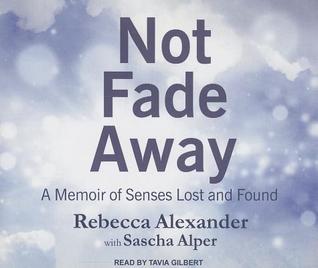What do you think?
Rate this book


Audio CD
First published September 11, 2014
. . . then I move on. I don't feel like the cards I've been dealt are unfair. I don't think that life is that complicated, and I know that pity is a trap that will deplete my self-esteem and take away time that I don't have to waste. I choose instead to be grateful: to be happy with what I have today, and to be optimistic about tomorrow. It's a conscious choice, and one that takes effort, but what's the alternative? What other choice do any of us have if we want to live our lives to the fullest? [p. 98]Chapters 49-53 are devoted to Alexander's investigation, and eventual acceptance, of a cochlear implant. Anyone who is in the market for such a device could read these pages profitably as a tutorial. Although the technology did significantly improve Alexander's speech comprehension, it took time and effort for her to adapt to it, and the natural voices that she once heard and treasured have forever been replaced by robotic-sounding digital inputs. In the final analysis, however, she is thankful for the advantages that medicine has provided to her, and although there is currently no cure in sight for her deteriorating vision (diagnosed as retinitis pigmentosa), she mentions some research that might eventually address it:
Waiting for advancements that will come eventually, soon enough, I hope, to help me, but I refuse to hold my breath. I have to live where I am and to be grateful for the sight that I have. [p. 298]Written in a highly informal style, Not Fade Away is honest and inspiring. And with America's just having exited a disastrous presidency, crowned by an annus horribilis, this book can serve as a pleasant and completely apolitical accompaniment to a positive and forward-looking new era.